Should Jadrolinija's Old Dubrovnik-Rijeka Line be Returned?
April the 19th, 2021 - Several years ago, Jadrolinija's management board decided to stop financing the old Dubrovnik-Rijeka line which ran in summer and it was dropped. Should it be returned?
As Jurica Gaspar/Morski writes, the Rijeka-Dubrovnik ferry line was considered unprofitable and was dropped, this decision of Jadrolinija's management put an end to the very long tradition of connecting the northern and extreme southern part of the Croatian Adriatic was unpopular with many.
Although back in 2016 the Croatian Government made a decision to reintroduce the so-called coastal "blue highway" for the whole year, after the sale of the Liburnija vessel, the former president of the board of Jadrolinija stated that the company doesn't even have a ship to sail on that line any more.
However, more and more people are becoming irritated by that decision, because many would have gladly chosen to travel along the Croatian coast by boat rather than by land.
''The only night Dubrovnik-Rijeka line which ran overnight was shut down without any explanation. It's necessary to return this line this season, which connects Kvarner with Dalmatia and vice versa, by ship, for at least three months,'' stated Tomislav Pavleka, who launched a public petition for this initiative, and explained:
''The boat was full every summer. If it's necessary to increase the price of the tickets, issue a concession for a deck restaurant to someone, establish a ship's jazz orchestra that would play under the stars, do anything to improve the offer of long-distance transport of passengers, motorcycles, bicycles, dogs, cars... then it should be done. Croatia must have one such coastal line,'' he said in his explanation of the aforementioned petition to return the Dubrovnik-Rijeka line.
The Dubrovnik-based initiative Srdj je Grad (Mount Srdj is the City) is also advocating for the return of the coastal ferry line which once connected Rijeka with the island of Korcula and then the City of Dubrovnik.
''In a situation when the number of rotations in air traffic is very uncertain and when we don't even know when charters and low-cost airlines will start flying again, it would be necessary to launch an initiative that can open up a new traffic route for tourists to the extreme south of Croatia. Everyone knows that Dubrovnik and its surroundings are a distinct air destination and that we depend on airlines flying down here. This is what has made us the most vulnerable during these challenging times, when the global economy is establishing new principles of functioning,'' they stated.
The holiday begins aboard the ship
Let's remember that Jadrolinija once had a very successful slogan for the Dubrovnik-Rijeka line ''The holiday begins aboard the ship'' which sailed to destinations on Korcula, Peljesac, Mljet and the Dubrovnik Riviera. With the introduction of subsidies on return tickets with discounts for longer stays at the destination (for example, 30 percent cheaper tickets for stays of five days and longer), high quality promotion and high security/safety standards when boarding at ports, we'd ensure the arrival of 2 -3 thousand guests a week in that southern Croatian county.
If we design a promotional tourist package with accommodation service providers that would make every fifth day a tourist spends in their destination free of charge, we would offer them a related service of subsidised boat tickets and additional overnight stays, which would extend guests' stays within their respective destinations and as such achieve higher consumption,'' they suggest from the aforementioned Dubrovnik initiative.
For more on maritime travel in 2021, make sure to check out our dedicated section.
Virtual Office Croatia Signs Agreement with Slovakian Embassy
April the 19th, 2021 - Virtual Office Croatia (Virtual Office Hrvatska) has expanded the list of foreign embassies they work with with the signing of a contract with the Slovakian Embassy in Croatia.
As Poslovni Dnevnik/Lucija Spiljak writes, Virtual Office Croatia has signed a memorandum of cooperation with the Embassy of the Slovak Republic in Croatia, thus expanding the list of embassies they work with, as well as with countries whose entrepreneurs are brought to the Croatian and European markets.
Virtual Office Croatia has thus become the main partner of the Embassy of the Slovak Republic for their companies expanding into the Republic of Croatia.
"The embassy automatically connects them with us and we continue to do business. So far, they've cooperated with the Croatian Chamber of Commerce (HGK), but because of our innovative approach, they turned to us,'' explained Matija Fontana, the director of Virtual Office Croatia, which has been offering services to both local and foreign clients since back in 2015 from its headquarters in virtual offices.
He added that the Slovaks recognised their Virtual Office concept as a modern and business friendly way of entering the not only the market of the Republic of Croatia, but that of the entire immediate region. Slovakia, on the other hand, wants to help its citizens invest here in Croatia, and Virtual Office Croatia, as a partner and as a private company, works hard to bring investors to Croatia.
Slovakia isn't the only country with which it has started cooperation, and so far it has achieved successful working relationships with the Embassies of Indonesia, India, Australia, Austria, Germany, USA and more.
"We've been proactive towards some countries, and some others have been the ones to contact us," explained Fontana, adding that they not only work with embassies as intermediaries for their entrepreneurs but also with foreign companies directly, allowing entrepreneurs operating outside of the EU to enter the bloc's valuable single market through Croatia.
The director also explained how the current coronavirus pandemic has contributed to the actualisation of the concept of a virtual office, and as he pointed out in an interview last year, working from home has been actively enrouaged throughout the pandemic, which resulted in cancelling the lease of physical business premises and switching to more economical and flexible business. He pointed out that virtual offices aren't just a trend today, but a response to the changing work habits that have occurred due to advances in technology and digitalisation.
"We're contacted by many foreigners who have opened companies here in Croatia and started businesses here, and what we primarily have to thank for this is mostly the sort of branding done by successful domestic companies such as Rimac, Infobip and Nanobit. You wouldn't believe how famous these companies are abroad, people who haven't heard of Croatia have still heard of Rimac, for example the Japanese come to Croatia and tell us that they want to do business in the country where Rimac also operates and that's a really big thing. The best thing in our whole story is that we enable them to not have to physically remain here in Croatia, and all the resources we use in business are Croatian resources, so people can stay abroad and yet still invest capital in Croatia,'' emphasised Fontana.
''Opening a bank account for foreigners should be simplified''
When asked what makes it difficult and easier for them to do business, they say that everything depends on the project, if, for example, construction projects are in question, the procedures can become more complicated. They also note that it is no longer much of a problem to open a company in Croatia because such things can now be done relatively quickly. However, there are other problems.
"Currently, our biggest problem is that banks are inflexible and take up a lot of our time in checking our clients. Clients who come to Croatia can de facto open a company in a few days, but a big barrier appears when they need to open a bank account, unfortunately clients have to come to Croatia several times because of that, and we know how complicated the situation is with travel and border crossings at the minute. but I don't think that's solely a Croatian issue, but one faced by the whole of the EU,'' explained Fontana.
He added that it should be easier to open a bank account, especially for clients who come from, for example, secure and safe countries such as Japan, Australia and the like.
"Perhaps it would be good to have a ''list of safe countries'' from which investors and entrepreneurs could more easily open a bank account and start their businesses in Croatia. On the other hand, certain clients tell us that it is easy for them to do business in Croatia, with good information and logistical support, some projects are even easier to implement than they are in the rest of Europe because the entry costs are much lower here,'' concluded Virtual Office Croatia's director.
For more, follow our lifestyle section.
Different Zagreb Earthquake Reconstruction Rules for New Property Owners
April the 19th, 2021 - There are different rules for those who are classed as new owners of property in the capital when it comes to Zagreb earthquake reconstruction, and if you fall into that category and decide to sell your apartment, you could be hit with quite significant costs.
As Poslovni Dnevnik/Suzana Varosanec writes, there are three conditions for co-financing post-earthquake reconstruction in Zagreb - ownership, residence and whether or not the property is the place you actually live in, which will be proven through neighbours and who bills are addressed to if necessary. According to the State Secretary at the Ministry of Physical Planning, Construction and State, Zeljko Uhlir, those who meet those conditions are to participate in the Zagreb earthquake reconstruction costs of their own properties in the amount of 20 percent. For others, the amount is a significantly higher 50 percent.
The same goes for owners of different types of property: for the first ''section'' which has been mentioned above, they participate with 20 percent, for the others the participation amount stands at 50 percent, but if someone sold their apartment, then the new owner must participate with 50 percent of the renovation costs, and in the case that someone sells their renovated apartment, they will need to return the invested funds or the costs and those associated with it will be passed on to the new owner.
What, in turn, is the difference between Zagreb earthquake reconstruction done yourself and renovation done through the appropriate fund? Can co-owners who don't want that sort of reconstruction be forced to accept it, and how will all of this be affected by the lack of workers, engineers and the rise in price of construction materials? These are all very pressing questions which obviously demand clear answers.
Then there is the question of how non-detached buildings will be dealt with? There are also questions surrounding older owners who aren't accustomed to using the internet and the whole procedure might become too complicated for them to understand. In the framework of the dialogue that has been going on for a long time now, among experts on the topic of reconstruction of buildings after the earthquake, in addition to the above questions, there are a number of those to which representatives of the profession are still looking for answers.
However, as confirmed by a recently held presentation on the basics of Zagreb earthquake reconstruction for members of the Chamber Association of Property, what there is no doubt about is that the renovation process will affect the capital's real estate market in the long run.
It will significantly affect the markets, but mostly people's lives, and therefore it should be approached in an organised manner at all levels. That was the central message of Dubravko Ranilovic.
According to Uhlir, only in the Zagreb area will the rehabilitation of buildings cost as much as the construction of motorways. The primary goal, he claims, is to ensure mechanical resistance and stability with the aim of protecting human health and life, while the secondary point is the urban renewal of the City of Zagreb and its surroundings, and the regeneration of the overall area. Recalling the rule that the EU doesn't provide funds for private property - the owners, in fact, must take care of it themselves, according to him it is malicious to make accusations and lie blame with the owners of old buildings when it comes to maintenance as most were not designed or built to withstand seismic loads, and therefore their restoration is extremely a complex job in which the profession must play a major role.
On the other hand, co-owners can organise and finance the Zagreb earthquake renovation process which refer to their properties themselves, and then demand a refund of the justifiably spent funds, which means that in this case the process may go much more quickly and smoothly, but Uhlir warned that they must pay attention to all of the documentation and that everything goes according to the rules and can be looked back at.
"Of course, the problem lies with the harmonisation of the the position of the co-owners, but it's possible to act legally if there's indeed a threat to life at play. A completely new law in building management is coming soon,'' said Uhlir, adding that the law was made according to the best experiences to date, but unfortunately we still don't have a single contract with a designer, let alone a contractor, ie there are a very limited number of people who understand this sort of construction and who have real life experience in it,'' he added.
The good news that the Secretary of State also put forward is that the deadlines for submitting applications have been moved to the period from 2021 to 2025 so that everyone will be able to submit them, but in conclusion it is worth emphasising his appeal to all not to attempt to fix any earthquake damage yourself, but be sure to contact authorised professionals for your own safety and for that of the buildings.
For more, make sure to follow our lifestyle section.
Croatian Tree Elements Project Attracts Attention and Donations
April the 19th, 2021 - The Croatian Tree Elements project, the brainchild of a young Croatian entrepreneur, is gaining tracting and a lot of attention for its unique concept.
As Suzana Varosanec/Poslovni Dnevnik writes, the Croatian Tree Elements project's owner has stated that although she knows that every entrepreneurial story can seem a bit crazy at the beginning, this one is a bit crazy in the most positive of ways.
''With the support of the community, Facebook and Instagram, a real miracle happened, so I'm very happy with the first results and I hope to raise at least 50,000 US dollars, of which about 20 percent is intended for financing taxes and other costs, while the remaining money is needed to complete the tourism/environmental project for Tree Elements, as well as for furnishing the houses and landscaping,'' young Croatian entrepreneur Ivona Ercegovic stated.
Sustainable luxury
Ercegovic is enthusiastic with the first reactions of the market to the more than successful start of her crowdfunding campaign in which the final tranche is collected for her ambitious project, the Croatian Tree Elements project, that combines tourism with real care for the environment.
The campaign has already raised 70 percent of its target amount on Kickstarter with 25,000 US dollars in just 24 hours of its launch. Beautiful tree houses near gorgeous Plitvice and all of their eco-friendly accompanying facilities are a visionary idea in which nature is in every respect the top priority.
The project has been described as an eco-friendly haven offering "sustainable luxury with minimal environmental impact". The Croatian Tree Elements complex will recycle all glass and plastic and generally minimise waste, will grow its own food and even install solar panels.
The Kickstarter campaign lasts for 30 days, and the first ''investors'' involved are in fact the first guests of the future complex. About 90 percent of them are from Croatia, while the rest are from America, where Ercegovic, as she explained, has gained a lot of contacts during her eight years of providing the service of a tourist guide.
An unusual concept
With their donations, they're currently earning points for accommodation and various services, and with a significant discount, they are actually buying an emerging product, explained this entrepreneur, announcing the opening of the Croatian Tree Elements project during the very first days of August this year.
“Given the uniqueness and strength of the idea that underlies this project, interested nature lovers have the opportunity to participate in its very emergence, which is a concept that may be unknown in our country, but globally it has its place in funding, marketing and even in PR,'' she stated.
The added value is the involvement of the community in this project, in other words, there will be a place in Croatia where "mother nature is the law", which was entirely created by the contribution of the community.
For more, make sure to follow Made in Croatia.
Fewer Turkish Airlines Istanbul-Zagreb Flights from May 1, Dubrovnik Line Still in Question
April 19, 2021 - The latest flight news to Croatia as Turkish Airlines announces fewer Istanbul-Zagreb flights from May 1, while the Dubrovnik line is still in question.
Croatian Aviation reports that the Turkish national airline will offer fewer weekly flights between Zagreb Airport and Istanbul in May compared to April.
In April, Turkish Airlines offered up to 9 flights a week on a direct route between Zagreb and Istanbul. In May, however, the airline reduces the number of weekly operations between the two mentioned cities, and only up to five flights a week are available.
Turkish Airlines offered a larger number of flights on this route in early April. As many as two flights a day were available three days a week; the company was obviously counting on increased demand around the Easter holidays. However, the number of operations in May will not be so large. From May 1, Turkish Airlines will reduce the number of operations to five flights a week and operate B737-800 aircraft and A320 family aircraft.
Direct flights between Istanbul and Zagreb in May will be available on Mondays, Wednesdays, Thursdays, Fridays, and Sundays, noting that flights on Wednesdays, Fridays, and Sundays are announced in the morning and on Mondays and Thursdays in the evening.
The second Turkish Airlines line in Croatia is the one to Dubrovnik, which the airline has operated since 2016. Turkish Airlines held a meeting with representatives of the Dubrovnik Tourist Board in January this year on re-establishing a direct line between Istanbul and Dubrovnik, which has been suspended since the outbreak of the global pandemic. It is currently possible to book a flight on this route for the beginning of June. However, the airline has been holding tickets to and from Dubrovnik since January 2020, then cancels those flights.
Whether Turkish Airlines will return to Dubrovnik this year remains to be seen, but Zagreb, as the company's Croatian destination, should not be questioned. In fact, in the peak season, we can expect daily flights to the Croatian capital depending on the restrictions.
As for the wider region, this well-known airline plans to operate in May to Ljubljana (3 times a week), Budapest (7 flights a week), Vienna (14 times a week), Belgrade (11 times a week), Sarajevo (8 times a week), Podgorica (9 times a week), Pristina (5 times a week), Skopje (5 times a week) and Venice (7 times a week).
Follow the latest on flights to Croatia HERE and the latest travel updates and COVID-19 news from Croatia HERE.
For more on travel in Croatia, follow TCN's dedicated page.
HNL Round 29 Recap: Belupo Shocks Gorica, Osijek Tops Hajduk at Poljud
April 19, 2021 - The 29th round of the Croatian First League was held from April 16 to 18, 2021. In this round, Belupo shocks Gorica at home, and Osijek tops Hajduk at Poljud.
Varazdin v. Sibenik (1:1)
Varazdin and Sibenik opened the 29th round on Friday, April 16, 2021.
Djurasek scored a goal in the 11th minute for an early Varazdin lead, which they maintained until the 75th minute when Sibenik's Juric scored a penalty to equalize 1:1.
Varazdin is currently in 8th place with 25 points, while Sibenik is in 7th with 28.
Gorica v. Slaven Belupo (0:1)
Gorica and Slaven Belupo met on Friday, April 16, 2021, in Velika Gorica.
The only goal of the match came in the 38th minute when Knoll scored for Belupo, which was the final score of the match.
Gorica is currently in 3rd place with 49 points, while Belupo is in 6th with 30.
Hajduk v. Osijek (0:1)
Hajduk and Osijek met on Friday, April 16, 2021, at Poljud Stadium in Split.
While the first half went without goals, Mierez scored in the 48th minute to give Osijek the early lead in the second half. A second yellow for Fossati in the 85th hurt Hajduk's chances of getting the equalizing goal.
Hajduk is currently in 5th place with 43 points, while Osijek is in 2nd with 65.
Rijeka v. Lokomotiva (3:0)
Rijeka and Lokomotiva met on Saturday, April 17, 2021, at Rujevica Stadium.
All of Rijeka's goals were scored in the first half - Muric in the 10 minute, Kulenovic two minutes later (12'), and Kulenovic again in the 31st. Lokomotiva was not able to come back from the first-half beating.
Rijeka is currently in 4th place with 48 points, while Lokomotiva is in the last place with 10.
Dinamo v. Istra 1961 (1:0)
Dinamo and Istra closed out the 29th round on Sunday, April 18, 2021, at Maksimir Stadium.
Petkovic scored a penalty in the 38th minute for the 1:0 Dinamo lead before the half, which they maintained throughout the match, even after Burton was booked with a red card in the 84th minute.
Dinamo is currently in 1st place with 67 points, while Istra is in 9th with 24.
You can see the full HNL table HERE.
To follow the latest sports news in Croatia, follow TCN's dedicated page.
To learn more about sport in Croatia, CLICK HERE.
Journey to Get the Croatian Digital Nomad Permit
April 18, 2021 - The number of successful applicants for the new Croatian Digital Nomad Permit is slowly increasing. Delighted to welcome Steve Tsentserensky to TCN, with a great first piece on the journey and the timeline.
March 26th, 2021 – Zagreb
The email is in Croatian. They’re always in Croatian. Which makes sense because I’m in Croatia and it’s the government that’s writing to me.
There’s a moment of terror because, ya know, I don’t speak Croatian and I’m certain this email holds the fate of my next 12 months within it.
December 8th, 2020 – New Jersey
“Will I get the results within 48 hours?”
“No, not a chance”
And with that, the swab goes further into my nose than I thought possible. I was equal parts impressed and uncomfortable to be honest.
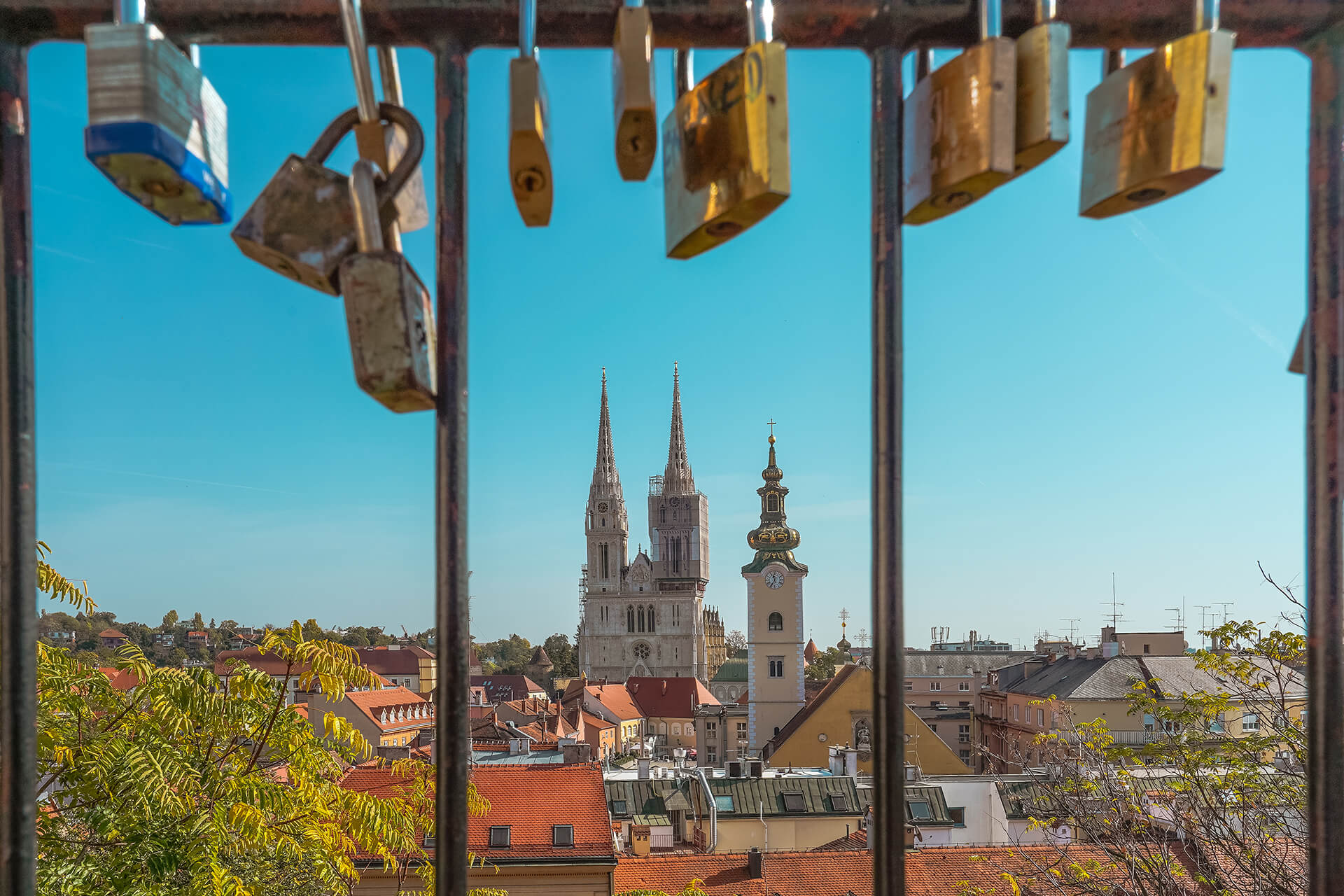
September 2014 – Dubrovnik
The story of the 7th digital nomad permit somehow starts in 2014.
The first time I set eyes on Croatia.
Dubrovnik.
Among other things, I drank an Ožujsko (I’ve since learned there are better beers) while soaking in the splendor of the Adriatic and bought a dark blue t-shirt with an anchor on it. Still have it somewhere. The shirt, not the beer.
The love affair didn’t start there though.
It wasn’t until 2019 that that happened. Unbeknownst to me at the time it was a few days in Zagreb in the dead of winter, just after New Year’s, that would set the wheels of this journey in motion.
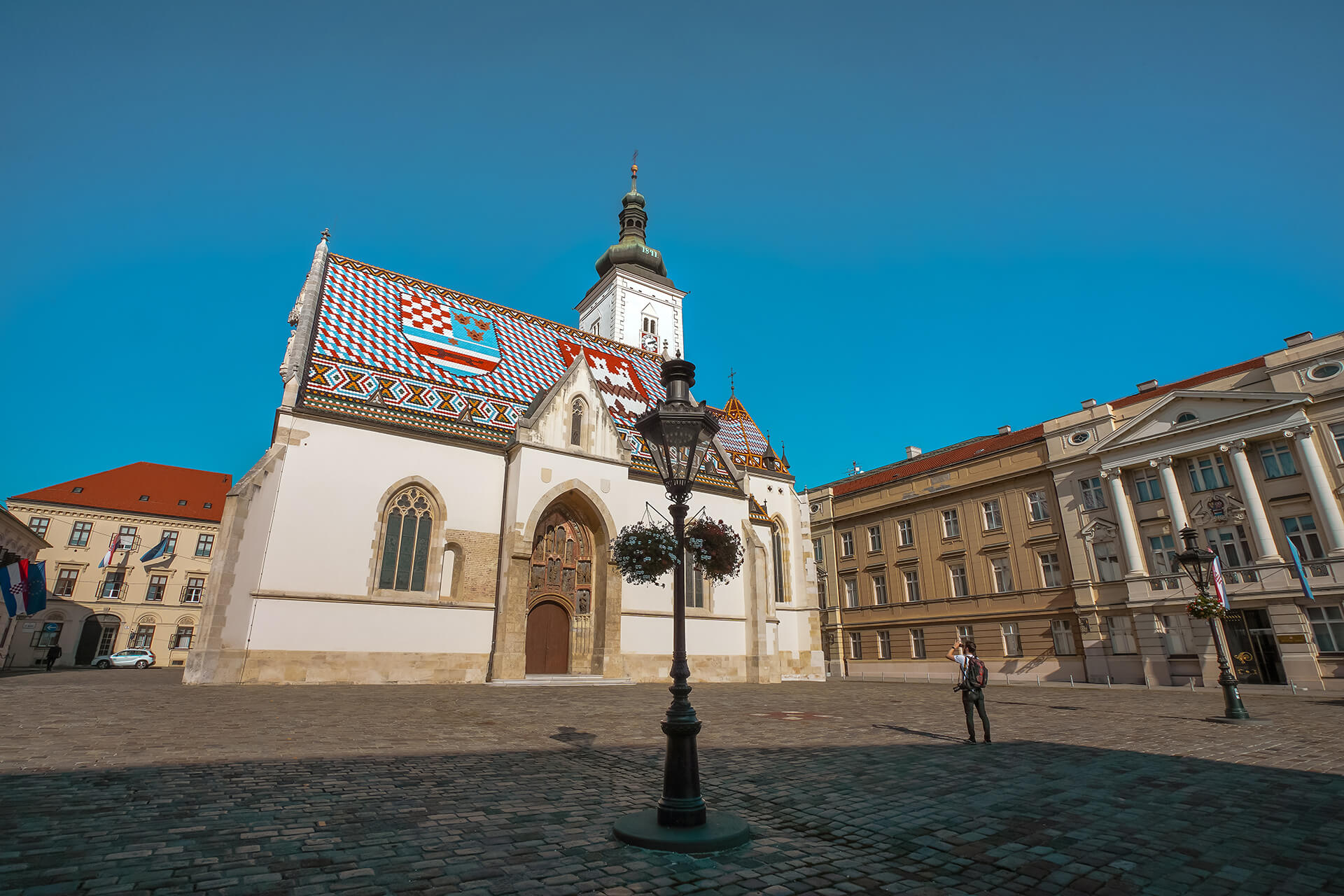
December 9th, 2020 – JFK Airport
Routinely ranked among the worst airports in the United States, it was my great joy and pleasure to be there on that crisp Wednesday evening. Traffic, due to covid, was non-existent so getting to this place where aggravation springs eternal was a breeze.
I snake my way through the check-in line, finally making it to the counter.
The woman looks at my papers in that way that makes you feel unnecessarily nervous.
She calls over a supervisor.
JFK truly living up to its ranking.
“Do you have your PCR test?”
I had printed an encyclopedia of papers including emails to the Polish border security to make sure I could transit Warsaw, to MUP here in Croatia to ensure I was in fact allowed to enter the country, health insurance documents, proof of accommodation, etc. But I never considered checking with JFK to see if they’d let me fly without a PCR result in hand.
“Yes, as a matter of fact, I do”
In keeping with Jersey tradition – unexpectedly delivering or being wrong all the time, whichever you prefer – it turns out I got my results within 24 hours.
The gods of getting to Croatia were smiling upon me and just like that, myself and about 100 Hasidic Jews were en route to Poland on a packed 788.
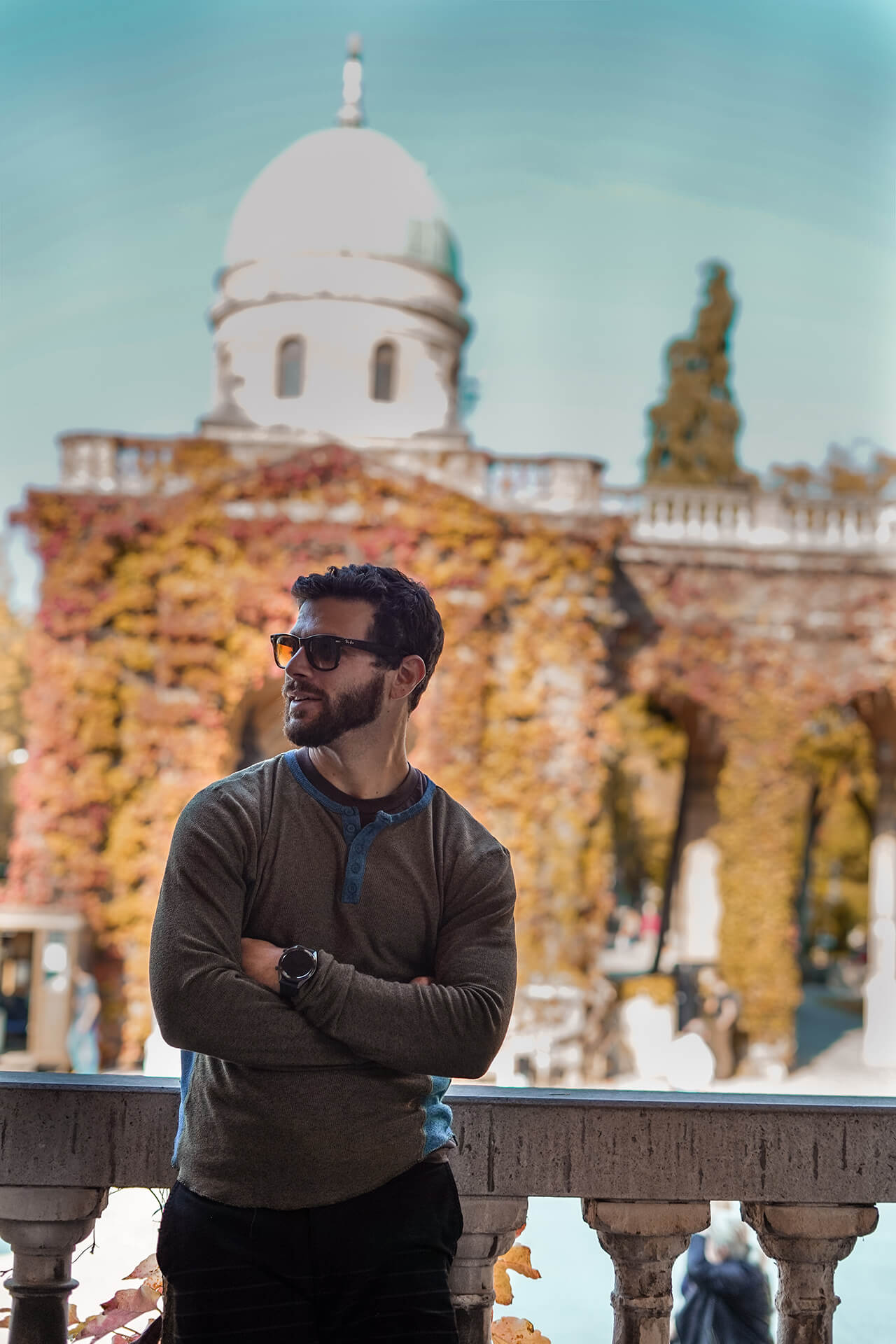
January 10th, 2019 – Zagreb
Fingers and toes utterly frozen with a dusting of snow on the ground, I was only in town for a matter of days but it was the whirlwind of people and their spirit, the beauty of the centuries-old architecture and more that warmed me to the core.
We don’t have that in Cleveland, where I’m originally from. I mean we have buildings and great people and the cold but the alchemy is somehow different.
It was the streets flowing into one another in an enchantingly chaotic way, making each turn a magic little mystery. The ease of getting across the city by foot or tram (which run on time! Looking at you New York). The stunning tiled roof of St. Marks Church with the medieval coat of arms of Slavonia, Dalmatia and Croatia on one half and the symbol of the city on the other.
The first meal I had was quite literally a mountain of cevapi.
Was it a little slice of heaven?
December 10th, 2020 – Zagreb – Franjo Tuđman Airport
I’m still not convinced I’m going to be allowed in. Such is life when your inner monologue isn’t your cheerleader.
The folder I’m holding contains basically every communication I had with everyone on the off chance I need to prove even the most minute detail of the fact that I’m allowed to enter Croatia.
The line is short but agonizingly long.
Finally, I get to the gatekeeper’s booth.
Slide over the passport.
“PCR test?”
Slide it over.
You never know where to look in these situations. Eye contact? Minimal eye contact?
I always feel I’m guilty of things I haven’t done at checkpoints.
Weeks pass in the space of a few seconds.
“Welcome to Croatia”.
August 2020 – New Jersey
Frankly, speaking for earth, this was a low period.
My work as a video producer and photographer had all but evaporated months earlier and I was in the midst of transitioning to being a full-time writer. Transition being a relative term. Writer too.
This is also around the time I started to see stories pop up for the digital nomad permit and it completely captured my imagination.
The more I read, the more excited I got. The daydreams got richer. Visions of city and sea crisper.
The seed was planted to get back and make it a longer stay.
I set an internal goal to be back in Zagreb by December and maybe get that visa if it was available. A longshot though.
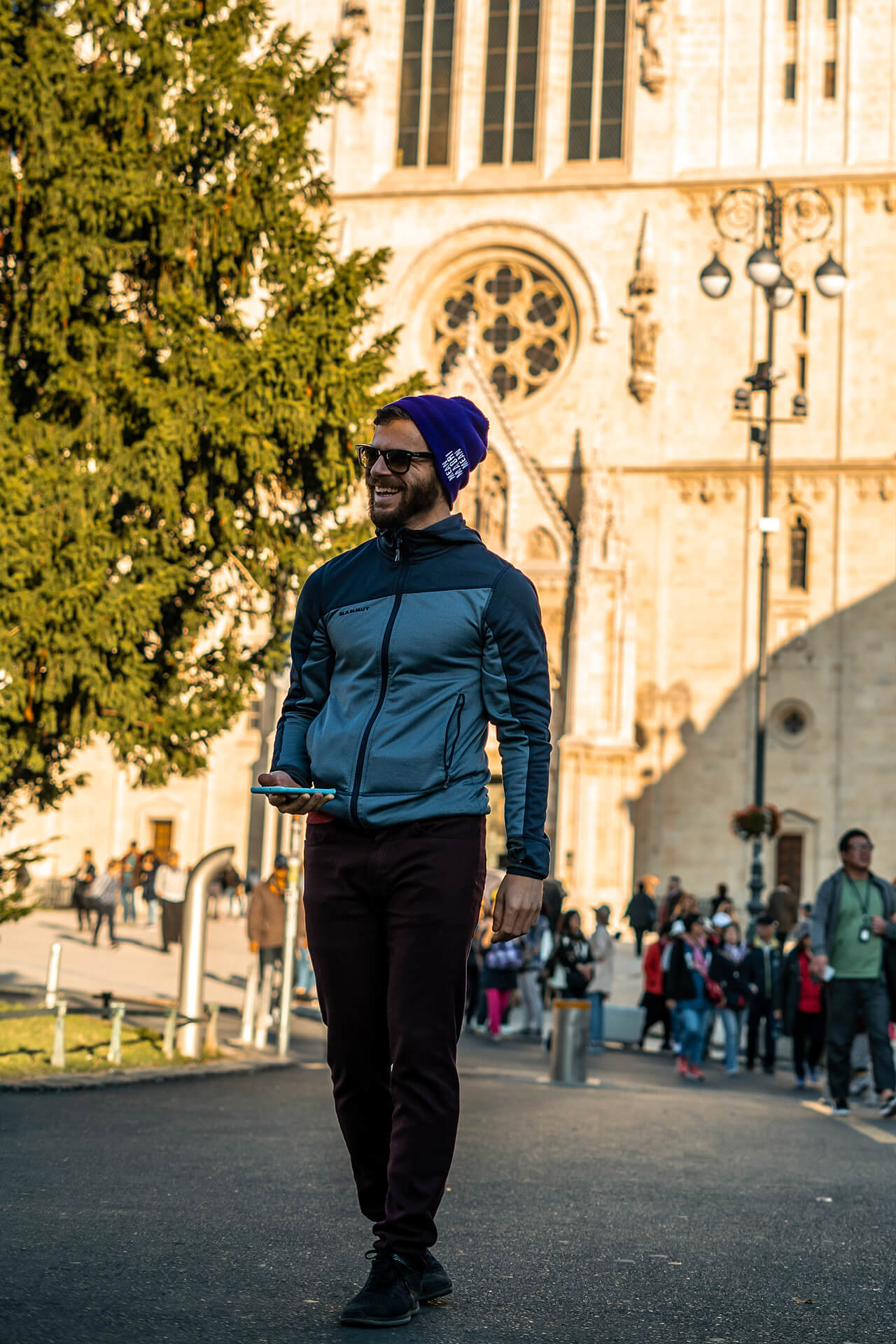
October 2019 – Zagreb
That handful of days in January weren’t enough and the brevity of it all left me wanting more.
I got a second helping, spending an entire month in Zagreb and letting the details of it wash over me.
I know what you’re thinking by now, why did I spend so much time in Zagreb and not by the sea?
Oft skipped in favor of the dreamy and luscious Croatian coast, Zagreb is secretly the whole fairy tale. You wouldn’t think it, perhaps because you haven’t even considered it, but finding yourself there is like discovering treasure. If Dubrovnik is the pearl of the Adriatic, then Zagreb is one of the (hidden) gems of Europe.
The joy of time seeming to slow as people enjoyed afternoon coffees at a million cafes. Investing meaningful time into relationships. Circling each Square – Jelačić, Britanski, Kralja Tomislava and more – and the majesty of finding yourself walking through history, all with a through line of that Austro-Hungarian charm. The delectable eats. The charming fact that the lanterns in Upper Town are still manually lit. The parks that dot the city, the mountain trails of Sljeme.
And it was good. And I was sold.
Monday, January 4th – March 25th, 2021 – Zagreb
This won’t come as a surprise to those who know, but Croatian bureaucracy is not famed for its expediency, so it came as a tremendous shocker that the digital nomad permit went from idea to reality in less than 6 months.
The goal I’d set in August felt tantalizingly achievable.
I assumed arriving in December meant I’d 100% be leaving by the middle of March. Which would’ve been disappointing but fine. I’d already been living a nomadic sort of life, working for cruise lines for a while, producing content for other companies around the globe and then hopscotching from country to country – generally 1 month at a time – before the pandemic. It was exhausting.
Fun, but exhausting.
3 months in one place was already marginally better though.
And then, all of a sudden, one year in Croatia was actually on the menu.
January 4th was the first day back to work and I promptly sent an email asking how to apply.
I received a detailed message the next day listing what was needed and 11 days later I submitted (almost) everything.
That email was swiftly lost and it wasn’t until February 1st, after a follow-up email, that the process formally got underway.
The only thing missing was a background check and let me tell you what, it is not easy to get fingerprints taken. It’s not something you think about every day or really ever but when you truly need them, in a foreign country, let’s just say getting them is not straightforward or effortless.
By the beginning of March my application was finally complete and it was back to the waiting game.
In the interim, my tourist visa expired (thankfully, you’re allowed to stay if your paperwork is in process) so the stakes increased considerably.
It’s worth pointing out here that I never made a backup plan on the off chance Croatia said no.
Smart.
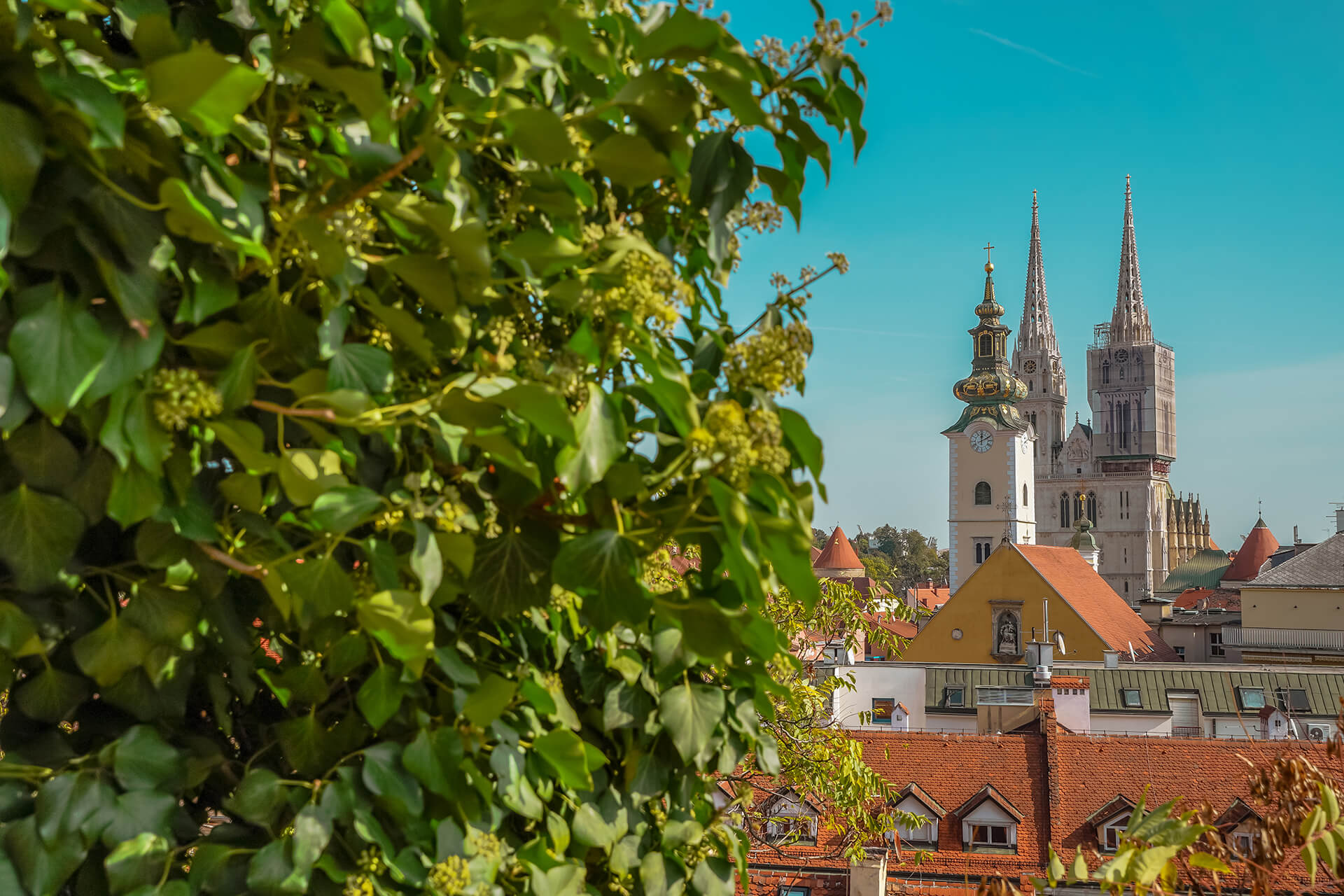
March 26th, 2021 – Zagreb
The email is in Croatian. They’re always in Croatian. Which makes sense because I’m in Croatia and it’s the government that’s writing to me.
There’s a moment of terror because, ya know, I don’t speak Croatian and I’m certain this email holds the fate of my next 12 months within it.
I’m at “home” across from Ribnjak Park. Birds are chirping. Spring is in the air.
I pop open Google Translate – my trusted companion though I rarely need it since basically everyone speaks English here – and paste the text.
I’m slightly disappointed it didn’t come on the 22nd, not a pleasant day in recent Zagreb history but it is my birthday and that would’ve been a nice present.
The email tells me what I’d been waiting patiently to hear and to come to their office.
Pro tip: save yourself an hour and make sure you’re not smiling in the picture you supply the government because you will 100% have to go print a new one.
Today, tomorrow and why Croatia to begin with?
Croatia obviously grabbed hold of me pretty quickly. It’s a sun-kissed land of seemingly endless, varied beauty and rich tradition that I’ve clearly only barely scratched the surface of.
Maybe it’s my own Slavic background, scroll back up and check out that last name, that helped make it click so instantly. Whatever it was, there’s now a deep and burning passion for the country and getting to know it better.
The permit means a lot to that end; stability, exploration, relaxation, adrenaline, learning, living, a home of sorts, an office and more.
Living here and working remotely with absolute ease is a privilege and joy that’s hard to overstate. There’s peace of mind that comes with knowing I can explore the country at my own pace, supporting local businesses along the way. Not having to rush to see everything and getting a chance to be really immersed in the places that I do go and, of course, meeting more of the generous, proud people who make the country such a welcoming place.
With the weather warming and summer fast approaching, that splendid coast beckons and that’s exactly where you’ll find me.
To be continued.
Živjeli.
Now check out Zagreb through Steve's eyes in this stunning video. Check out more of his work on www.sbtproductions.com
For more on digital nomads in Croatia, follow the dedicated TCN section.
Meet Dubrovnik's Digital Nomads-in-Residence: Charlie Brown from UK in Zagreb
April 18, 2021 - The 10 winners of the innovative Dubrovnik Digital Nomad-in-Residence (DNiR) competition have been announced. Meet them one by one. Next up, Charlie Brown from the UK in Zagreb.
The DNiR programme, which has been designed by Saltwater Nomads, in partnership with Total Croatia News, the CIty of Dubrovnik and the Dubrovnik Tourist Board (and financed by the latter two), is an innovative direction for the Pearl of the Adriatic, as it looks to diversify its tourism strategy away from overtourism and in the wake of the pandemic.
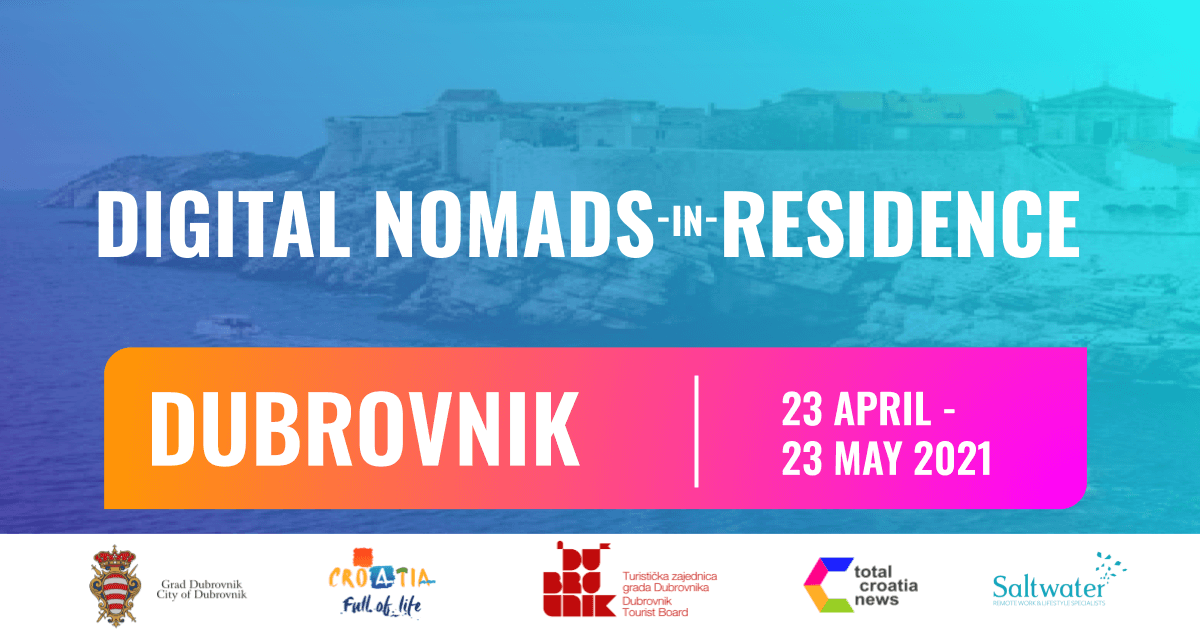
My name is Charlie, I'm a freelance wine, travel, food, entrepreneurship and finance writer, after selling my British-based wine store and bar last year, as well as my house and pretty much everything I own for a permanent life on the road.
1. You are a DN-i-R winner. Congratulations! How do you feel?
Surprised, shocked and excited! It's one of those things; If you told me a year ago, I'd be winning a competition to live in Dubrovnik for a month, working on all things around digital nomadism, I'd have told you that you'd imbibed too much of my product and you needed to go home.
2. How did you hear about the competition, and why did you decide to apply?
I saw it on a Facebook group. Since leaving the security of my old life, one of my aims was to say yes to as much as possible; I saw the competition and thought, that's the kind of thing I could say yes to! Croatia is such a great country, after all. And as a Brit, since Brexit, I've been forced to think differently about how I travel. To me, digital nomad visas are an incredible idea, that will help to open up the world as we slowly emerge from the pandemic. I love how forward thinking they are, and I want to be a part of it.
3. Which particular skills and ideas will you be bringing to the party?
Anything wine-related, of course. For nearly 10 years I've hardly thought about anything else, so if you want a wine tasting (or indeed, wine drinking) session, I'm your woman. And entrepreneurship advice, particularly around setting up small, ethical, sustainable businesses. Then there's writing, particularly in the travel, food and wine sphere.
I also have an encyclopedic knowledge about Eurovision of all things, and the competition is held during the month we're in Dubrovnik, so if you want to know how many times Croatia has entered in the last 10 years or some other random fact, hit me up!
4. What are you most looking forward to about DNIR?
Meeting new people and learning from them is surely number one. I love learning about how other people live, what they do, gaining new perspectives on life. I also think Dubrovnik's new focus toward sustainable tourism is very interesting and will open the city up to a whole new way of welcoming visitors, and I'm looking forward to being a small part of that. Finally, on a personal note, I'm super excited to learn about Dubrovnik and the surrounding areas. I've not visited in 13 years so it's not a part of Croatia I know very well and I'm excited to change that.
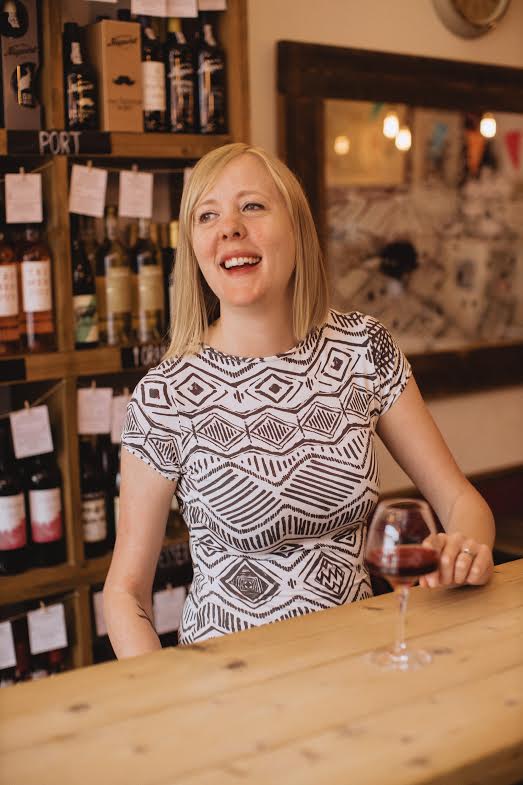
5. Let's get you involved in the Dubrovnik community. Who or what would you like to connect with?
I believe that the best way to get to know a community is through its food and its alcohol. So wineries would be number one, local craft breweries number two but also any restaurants and bars that have a focus on wine and regional cooking.
Here is Charlie's application video:
You can learn more about the programme here.
Saltwater Nomads' Tanja Polegubic on Dubrovnik Digital Nomad-in-Residence Programme
Dubrovnik Mayor Mato Frankovic on Digital Nomads, US Flights, 2021 Season
For the latest digital nomad news from Croatia, follow the dedicated TCN section.
The winner announcement video:
Other winners featured so far:
Albert Cañigueral in Barcelona
Carolyn Zenilow from USA in Stari Grad, Hvar
Kelsey Kay Love from Texas in LA
Rob Schubert from the Netherlands in Estonia
Ron Tardiff from USA in Budapest
Zoltan Nagy from Hungary in Tenerife
€2m Allocated From State Budget For 16 Big Sports Events in Croatia in 2021
April 18, 2021 - The Tourism and Sports Ministry will co-finance the organization of 16 major sports events in Croatia this year in the amount of HRK 14.6 million.
Minister Nikolina Brnjac made a decision on allocating the funds after a public call, held for the fourth year in a row, during which time 44 major events have been co-financed.
"Besides the sporting significance, these events also have great promotional and tourist value for Croatia," Benjac said, adding that some of this year's 16 events were already recognized in the world. At the same time, some would take place for the first time.
The events to be co-financed this year are:
- WACT Zagreb 2021 - Hanžeković Memorial and Ivan Ivančić Memorial track and field contest
- WRC Croatia Rally 2021
- CRO Race cycling contest
- The European Shooting Championships EPSO 2021
- The DOBRO World Cup Osijek 2021 for gymnastic athletes
- The 56th European Senior Karate Championships
- The FIBA Olympic Qualifying Tournament
- AUDI FIS World Ski Cup "Snow Queen Trophy" 2021
- ATP Tour - Croatia Open Umag
- Croatia Tennis Pro Tournaments
- World Rowing Cup I
- UWW Zagreb Open Grand Prix wrestling tournament
- Croatia Grand Chess Tour
- WTA Croatia Bol Open
- Pannonian Challenge in skateboarding
- The 25th Youth Sports Games 2021
To follow the latest sports news in Croatia, follow TCN's dedicated page.
To learn more about sport in Croatia, CLICK HERE.
Media Literacy Days To Be Held on April 19-25
April 18, 2021 - The Electronic Media Agency (AEM) and UNICEF Croatia will organize Media Literacy Days on April 19-25, focusing on the impact of media on the mental health of children and adolescents.
"Apart from mental health, the event will focus also on the current problem of misinformation and fake news, influencers and generally the development of critical thinking about media content as well as ways to better understand how different types of media function," the AEM said.
It noted that these topics are dealt with in new educational materials, which it will be possible to download from the web portal, where materials published in past years are also available for teachers and parents.
The project is supported, as in previous years, by the ministries of culture and media and science and education.
The purpose of the project is to raise public awareness of the importance of media literacy, empower citizens with media literacy skills, create a platform for cooperation among numerous social stakeholders, develop sustainable media literacy projects, and support teachers by developing education material for media literacy, the AEM said.
Considering the coronavirus pandemic, the event will largely be held online.
For more about news in Croatia, follow TCN's dedicated page.


